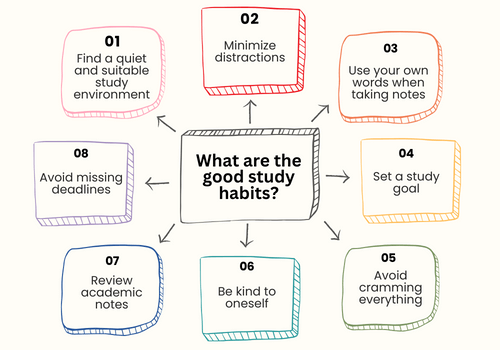CGKY News Hub
Your go-to source for the latest insights and trends.
Study Like a Pro: Tricks That Actually Work
Unlock your study potential! Discover proven tricks that supercharge your learning and boost your grades effortlessly.
Top 10 Proven Study Techniques for Academic Success
Academic success hinges on effective study habits, and adopting the right techniques can significantly enhance your learning experience. Here are the top 10 proven study techniques that can help you achieve your academic goals:
- Active Recall: This technique involves actively stimulating your memory during the learning process. By testing yourself on key concepts without looking at your notes, you reinforce your memory retention.
- Spaced Repetition: Instead of cramming, space out your study sessions over time. This method leverages the psychological spacing effect, which allows for better long-term retention of information.
- Pomodoro Technique: Break your study time into intervals (typically 25 minutes), followed by short breaks. This method increases focus and prevents burnout.
In addition to these techniques, visual aids such as mind maps and charts can help you understand complex subjects more easily. Moreover, organizing your study materials and creating a dedicated study space can vastly improve your productivity. For effective revision, consider group studies or teaching concepts to peers, as explaining information can solidify your understanding. Implementing these strategies will not only enhance your learning but also pave the way for academic success.

How to Create an Effective Study Schedule: A Step-by-Step Guide
Creating an effective study schedule is crucial for academic success, as it helps you manage your time efficiently and stay organized. Start by assessing your current commitments and academic workload. Make a list of all your subjects and the topics you need to cover, along with important deadlines and exam dates. This preliminary step will give you a clear picture of what you need to accomplish. Next, prioritize your subjects based on their difficulty and your understanding of the material. Setting clear goals for each study session will ensure that you stay focused and make progress.
Once you have a list of priorities, it's time to design your study schedule. Use a calendar or planner to allocate specific time slots for each subject throughout the week. Be sure to include regular breaks to avoid burnout and maintain productivity. A good rule of thumb is to follow the Pomodoro Technique, which consists of 25 minutes of focused study followed by a 5-minute break. Additionally, consider incorporating review sessions to reinforce your learning. Consistency is key—commit to your schedule, but also stay flexible to accommodate unexpected changes.
Are You Studying Efficiently? Signs You Need to Change Your Approach
Many students often find themselves asking, “Am I studying efficiently?” While the answer may seem straightforward, various signs can indicate that your current study methods aren’t yielding the best results. One key sign is if you’re struggling to retain information after your study sessions. If you find yourself cramming the night before an exam but still feeling unprepared, it’s a clear signal that your approach needs reevaluation. Additionally, if you notice you’re spending long hours studying without significant progress, it’s time to consider more effective strategies.
Another important aspect to consider is your level of engagement during study sessions. If you often find yourself distracted or zoning out, it’s a strong indication that your study environment or techniques might not be conducive to learning. According to experts, incorporating active learning methods, such as self-quizzing or teaching others, can greatly enhance retention and understanding. To determine if your study habits are efficient, reflect on your overall satisfaction and performance. If you’re not seeing the results you desire, it might be time to explore new strategies and make necessary adjustments.